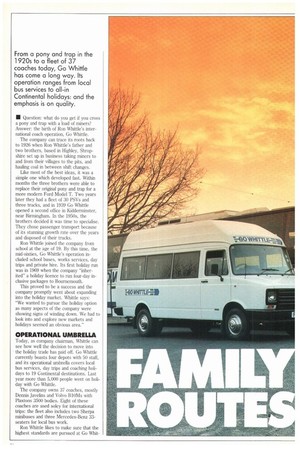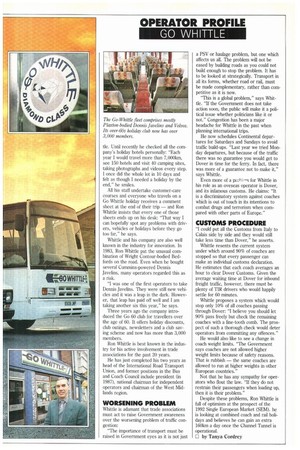From a pony and trap in the 1920s to a
Page 52

Page 53

If you've noticed an error in this article please click here to report it so we can fix it.
fleet of 37 coaches today, Go Whittle has come a long way. Its operation ranges from local bus services to all-in Continental holidays: and the emphasis is on quality.
/ Question: what do you get if you cross a pony and trap with a load of miners? Answer: the birth of Ron Whittle's international coach operation, Go Whittle.
The company can trace its roots back to 1926 when Ron Whittle's father and two brothers, based in Highley, Shropshire set up in business taking miners to and from their villages to the pits, and hauling coal in between shift changes.
Like most of the best ideas, it was a simple one which developed fast. Within months the three brothers were able to replace their original pony and trap for a more modern Ford Model T. Two years later they had a fleet of 30 PSVs and three trucks, and in 1939 Go Whittle opened a second office in Kidderminster, near Birmingham. In the 1950s, the brothers decided it was time to specialise. They chose passenger transport because of its stunning growth rate over the years and disposed of their trucks.
Ron Whittle joined the company from school at the age of 19. By this time, the mid-sixties, Go Whittle's operation included school buses, works services, day trips and private hire. Its first holiday run was in 1969 when the company "inherited" a holiday licence to run four-day inclusive packages to Bournemouth.
This proved to be a success and the company promptly went about expanding into the holiday market. Whittle says: "We wanted to pursue the holiday option as many aspects of the company were showing signs of winding down. We had to look into and explore new markets and holidays seemed an obvious area."
OPERATIONAL UMBRELLA
Today, as company chairman, Whittle can see how well the decision to move into the holiday trade has paid off. Go Whittle currently boasts four depots with 50 staff, and its operational umbrella covers local bus services, day trips and coaching holidays to 19 Continental destinations. Last year more than 5,000 people went on holiday with Go Whittle.
The company owns 37 coaches, mostly Dennis Javelins and Volvo BlOMs with Plaxtons 3500 bodies. Eight of these coaches are used soley for international trips: the fleet also includes two Sherpa minibuses and three Mercedes-Benz 33seaters for local bus work.
Ron Whittle likes to make sure that the highest standards are pursued at Go Whit tle. Until recently he checked all the company's holiday hotels personally: "Each year I would travel more than 7,000km, see 150 hotels and visit 40 camping sites, taking photographs and videos every step. I once did the whole lot in 10 days and felt as though I needed a holiday by the end," he smiles.
All his staff undertake customer-care courses and everyone who travels on a Go Whittle holiday receives a comment sheet at the end of their trip — and Ron Whittle insists that every one of those sheets ends up on his desk: "That way I can hopefully spot any problems with drivers, vehicles or holidays before they go too far," he says.
Whittle and his company are also well known in the industry for innovation. In 1983, Ron Whittle put the unusual combination of Wright Contour-bodied Bedfords on the road. Even when he bought several Cummins-powered Dennis Javelins, many operators regarded this as a risk.
"I was one of the first operators to take Dennis Javelins. They were still new vehicles and it was a leap in the dark. However, that leap has paid off well and I am taking another six this year," he says.
Three years ago the company introduced the Go 60 club for travellers over the age of 60. It offers holiday discounts, club outings, newsletters and a club saving scheme and now has more than 3,000 members.
Ron Whittle is best known in the industry for his active involvement in trade associations for the past 20 years.
He has just completed his two years as head of the International Road Transport Union, and former positions in the Bus and Coach Council include president (in 1987), national chairman for independent operators and chairman of the West Midlands region.
WORSENING PROBLEM
Whittle is adamant that trade associations must act to raise Government awareness over the worsening problem of traffic congestion: "The importance of transport must be raised in Government eyes as it is not just a PSV or haulage problem, but one which affects us all. The problem will not be eased by building roads as you could not build enough to stop the problem. It has to be looked at strategically. Transport in all its forms, whether road or rail, must be made complementary, rather than competitive as it is now.
"This is a global problem," says Whittle. "If the Government does not take action soon, the public will make it a political issue whether politicians like it or not." Congestion has been a major headache for Whittle in the past when planning international trips.
He now schedules Continental departures for Saturdays and Sundays to avoid traffic build-ups. "Last year we tried Monday departures, but because of the traffic there was no guarantee you would get to Dover in time for the ferry. In fact, there was more of a guarantee not to make it," says Whittle.
Even more of a prO,Irrn for Whittle in his role as an oveseas operator is Dover, and its infamous customs. He claims: "It is a discriminatory system against coaches which is out of touch in its intentions to combat drugs and terrorism when compared with other parts of Europe."
CUSTOMS PROCEDURE
"I could put all the Customs from Italy to Calais side by side and they would still take less time than Dover," he asserts.
Whittle resents the current system under which around 90% of coaches are stopped so that every passenger can make an individual customs declaration. He estimates that each coach averages an hour to clear Dover Customs. Given the average waiting time at Dover for inbound freight traffic, however, there must be plenty of TIR drivers who would happily settle for 60 minutes.
Whittle proposes a system which would stop only 10% of all coaches passing through Dover: "I believe you should let 90% pass freely but check the remaining coaches with a fine-tooth comb. The prospect of such a thorough check would deter operators from committing any offences."
He would also like to see a change in coach weight limits. "The Government says coaches are not allowed higher weight limits because of safety reasons. That is rubbish — the same coaches are allowed to run at higher weights in other European countries."
Not that he has any sympathy for operators who flout the law. "If they do not restrain their passengers when loading up, then it is their problem."
Despite these problems, Ron Whittle is full of optimism at the prospect of the 1992 Single European Market (SEM). he is looking at combined coach and rail holidays and believes he can gain an extra 160km a day once the Channel Tunnel is operational.
LI by Tanya Cordrey












































































































